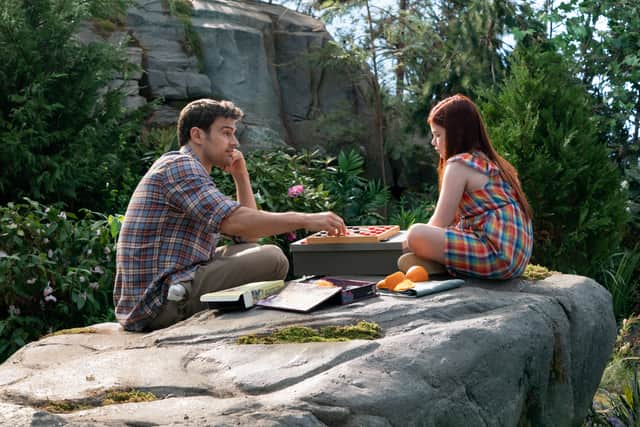The Time Traveler’s Wife review: an uncomfortable but often rewarding series from Doctor Who’s Steven Moffat
and live on Freeview channel 276
The Time Traveler’s Wife was an odd choice of project for Steven Moffat – and in some ways a risky one, too.
Audrey Niffenegger’s book was a huge influence on Moffat’s Doctor Who work, from one-off episodes like The Girl in the Fireplace in 2006 to major characters like Amy Pond and River Song. A straightforward adaptation of The Time Traveler’s Wife now, after taking inspiration from it for so long, runs the risk of seeming like a retread from a writer fast running out of ideas. Even a good adaptation would have to contend with a sense of repetition; a bad adaptation would threaten to expose where the writer got all his ideas from previously, and maybe even diminish them too.
Advertisement
Hide AdAdvertisement
Hide AdLike much of Moffat’s Doctor Who work, The Time Traveler’s Wife is a love story in the wrong order. Henry DeTamble (Theo James) is a time traveller – not consciously so, but accidentally, suffering from a seemingly unique genetic condition that sees him slip backwards or fall forwards in time at random. “Time travel is what’s wrong with me,” remarks Henry early on, and there’s little glamour to his condition, with the series committed to conveying just how difficult this makes his life both practically and emotionally.
What it also means is that when he meets Claire Abshire (Rose Leslie) for the first time at 28, she already knows who he is – she’s met his future self, and she knows they’re going to be married one day. When Claire was six, a 32-year-old Henry appeared in her garden; over the next 14 years, as different Henrys of different ages visit Claire, she starts to realise he’s not an imaginary friend at all, and gradually begins to understand that it’s not a coincidence that his wife in the future shares her first name.
There’s a certain, for lack of a better word, ickiness baked into the premise. The Time Traveler’s Wife invokes a particular tradition of children’s literature, drawing on stories like Tom’s Midnight Garden to lend scenes with the young Claire an almost fairytale-aesthetic - but there’s something quite jolting about how that childhood innocence is then juxtaposed with sex scenes. (Especially, for example, when Claire declares a desire for “everything you, personally, have conditioned me to want”.) The series walks as careful a line as it can – the characters are conscious of and draw attention to that strangeness, and Henry’s friendships have a similarly non-linear dimension too – but it would be difficult to blame anyone too uncomfortable to get past that basic premise.


If you can, though, watching The Time Traveler’s Wife proves rewarding. There’s a real emotional clarity to the series, cutting through the complexities presented by time travel – she’s disappointed he’s not yet the man he’s going to become, but he only becomes that man with her influence – to get to the heart of the romance underneath. The Time Traveler’s Wife is conscious of the underlying tragedy and sadness of Claire and Henry’s relationship, how foreknowledge can be a dangerous thing, but that’s tempered by a genuine belief in the strength and value of their relationship in the here and now (whenever that might be).
Advertisement
Hide AdAdvertisement
Hide AdThe series is grounded by James and Leslie, who each have quite difficult jobs here – him playing Henry at different ages and as fundamentally different people, her as the closest thing The Time Traveler’s Wife has to a still point to anchor itself around. In some ways it’s perhaps a better showcase for James, who cleaves between iterations of Henry with deftness and skill, but it’s hard to imagine it working without Leslie.; tThere’s a reason, after all, why it’s called The Time Traveler’s Wife and not The Time Traveler, and Leslie is essential to everything that works about the series.
It’s recognisably Moffat’s work (the third episode is one big dinner party farce as two versions of Henry meeting Claire’s friends), with his characteristic inventiveness and wit applied to… well, what have become his characteristic themes. Quickly, though, it starts to become apparent why he might have been drawn to this adaptation, beyond just a genuine love of the book: there are new things to do with these themes. The Time Traveler’s Wife comes across not as a retread but as an evolution, maybe even a maturation, of his work on Doctor Who. It’s not the first time he’s tackled these themes, but as The Time Traveler’s Wife continues (a second series is currently in development) it might one day grow to become the best.
Ultimately, The Time Traveler’s Wife arrives as probably the best version of itself it could be. Sometimes it is spiky and uncomfortable, often by accident and sometimes seemingly without realising.; at other times, there’s something genuinely affecting about it, using the sci-fi contrivance as a way to say things about lingering trauma and the unpredictability of love. The risk paid off, in the end.
The Time Traveler’s Wife begins on Sky and NOW TV on Monday 16 May. I’ve seen all six episodes before writing this review.
Comment Guidelines
National World encourages reader discussion on our stories. User feedback, insights and back-and-forth exchanges add a rich layer of context to reporting. Please review our Community Guidelines before commenting.
